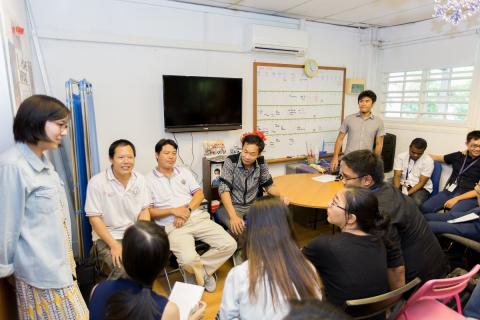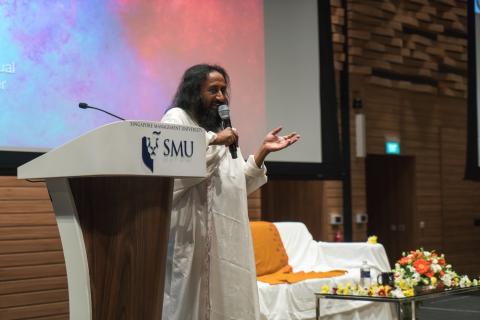Throughout the world, the opportunity and appeal of cities is beset by challenges and compromises. Cities continue to attract people looking for upward socio-economic mobility, and companies looking to create value. In a public forum hosted by the Singapore Management University (SMU) Shirin Fozdar Programme (SFP), Professor Lily Kong shared her thoughts on the promises and shortcomings of cities in development, and ventured suggestions as to how to address some of them. The forum, held at SMU’s Mochtar Riady Auditorium on 8 September 2017 drew an audience of more than 280, comprising academics, professionals, urban planners and students.

In her welcome remarks, Ms Claire Chiang, SFP Chairperson and Co-Founder of Banyan Tree Holdings thanked Professor Lily Kong for helming the keynote address at this year’s Shirin Fozdar Annual Lecture with a topic that has grown in increasing relevance, for cities around the world and for Singapore. SFP will continue to build on its strong foundation and serve as a partner for forums such as this lecture, that help to connect the dots on socio-economic issues and which contribute to the holistic growth of the community.
Ms Chiang highlighted that RICE – Resilience in community, Inclusiveness at all levels, Connectivity to the World, and Engagement for Women – continues to be the fundamental guiding principles which founded the SFP. In this spirit, SFP champions partnerships with businesses, policymakers, private and non-profit organisations to design collective programmes for positive social change. The forum represents a platform with which to connect these stakeholders to foster a resilient community and to nature integrated perspectives.
Professor Lily Kong, SMU Provost and Lee Kong Chian Chair Professor of Social Sciences, a distinguished expert on social and cultural change in Asian cities, kicked off the lecture by discussing the challenges of urbanisation. With overcrowding, traffic congestion, pollution and housing shortages visibly felt by city dwellers, the problems of overcrowding and inequality are being felt all over the world. Painting this picture in numbers, Prof Kong shared that in 2017, 1 in 10 people live in slums in India – which totalled up to a whopping 104 million people. Urbanisation had led to tremendous pressures on public services and natural resources; according to USAID 2013, only 40% of urban households in Indonesia had access to piped clean water.

“The city is recruited from the city.” Quoting poet Ralph Waldo Emerson, Prof Kong highlighted the fact that despite such challenges, flocks of people continue their migration to cities. In certain cities, growth in population had been even more pronounced due to their allure and the value that cities create for people. This could be seen in terms of how cities seemed to be more diverse places in which to live; cities enabled upward socio-economic mobility and the promise of better incomes; they attract the world’s most innovative companies and are home to the world’s most iconic architecture.
In speaking on the opportunities that cities in development presented, Prof Kong delved into urban solutions for sustainability. With smart cities being in the vogue and urban planners becoming more vocal in the past five years in supporting the uptake of technology, there is potential for cities to become more sustainable and liveable. Singapore, through its embrace of Smart Nation initiatives, serves as a clear example.

During a lively Q&A moderated by SMU’s Professor of Sociology (Practice) and Dean of Students, Paulin Tay Straughan, Prof Kong elaborated that a sustainable city is one that recognises the humanity of cities. She viewed environmental sustainability not only in terms of go green measures, but also in terms of looking at spaces around us as repositories of human meaning and seeing the potential of organically evolved cultural spaces. Encouraging SMU students in the audience to take ownership of the spaces around us, Prof Kong reminded one and all of SMU’s excellent location within the heart of the city. In building a liveable and sustainable city, Prof Kong shared that it would be beneficial for more diversity among urban planners, to ensure that more sensitivities are observed towards the different needs of demographic groups in the population.
In his closing remarks, SMU President Arnoud De Meyer commented that there was no better time than the present to invest resources into the study of developing urban environments that harmonise the management of density and diversity. In August 2017, SMU had introduced a new interdisciplinary major in Smart-City Management and Technology, offering students opportunities to participate in the development of cutting-edge smart city solutions. In the area of research, SMU had also demonstrated excellence in Urban Sustainability and Management. President De Meyer thanked Prof Lily Kong for her insights and the new ideas he had learnt listening to her lecture; one of which was particularly memorable – to quote the Financial Times, “the biggest annual mammalian migration on earth” was taking place in China. He also thanked Ms Chiang for her exemplary leadership as chairperson of the SFP at SMU for the last eight years and highlighted the ways in which the SFP has made an impact on faculty, and staff, as well as the community through its active outreach programmes over the years.